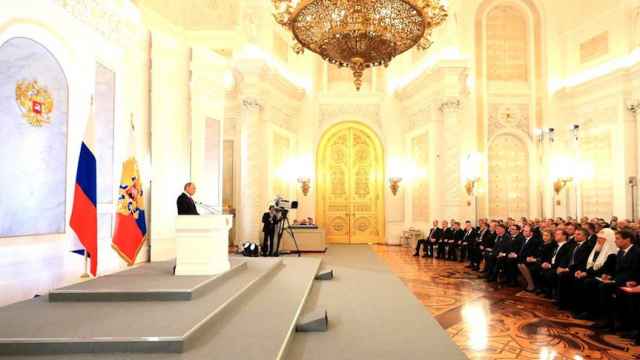Russia's Moskovskiy Kreditniy Bank has sparked outrage and confusion with a controversial Christmas commercial showing Father Christmas kidnap and torture a single mother.
The ad features Russia's Santa Claus, Ded Moroz (Grandfather Frost), who kidnaps a single, working mother and takes her on a torturous journey across the tundra to teach her a lesson about spending more time with her daughter.
The clip begins with a child sitting in the dark, writing a letter to Ded Moroz. “I know my mother is very busy," she says. "She buys me toys. But more than anything, I want to be with my mom. Please bring her back to me.”
The advertisement then shows the busy mother leaving her office late at night. She calls a taxi, but in a sinister turn the elderly, bearded driver — Ded Moroz — locks the doors and kidnaps her. He leads the businesswoman on a long and torturous journey, pulling her across lakes, rivers and snowy mountains by a rope tied around her waist.
After several days, Ded Moroz appears to have a heart attack. Rather than run, the mother cries and tries to aid her kidnapper, prompting him to finally hand over her daughter's letter. The drawing comes alive, and mother and daughter are then reunited in perfect symphony.
The bank's commercial has caused outrage among women, who see the video as an attack on working mothers. “The first thing the authors of this clip tell us is that a successful woman cannot be a good person,” Russian feminist Anastasia Karimova wrote in Cosmopolitan Russia. “We have one question: where is the father?” she asks.
Alena Popova, the co-founder of StartUpWomen, a networking website for female professionals also took to Facebook to express her anger: “Where did you find that a working woman is a bad mother? Where are those statistics from? Russia is a country of working mothers.”
A Message from The Moscow Times:
Dear readers,
We are facing unprecedented challenges. Russia's Prosecutor General's Office has designated The Moscow Times as an "undesirable" organization, criminalizing our work and putting our staff at risk of prosecution. This follows our earlier unjust labeling as a "foreign agent."
These actions are direct attempts to silence independent journalism in Russia. The authorities claim our work "discredits the decisions of the Russian leadership." We see things differently: we strive to provide accurate, unbiased reporting on Russia.
We, the journalists of The Moscow Times, refuse to be silenced. But to continue our work, we need your help.
Your support, no matter how small, makes a world of difference. If you can, please support us monthly starting from just $2. It's quick to set up, and every contribution makes a significant impact.
By supporting The Moscow Times, you're defending open, independent journalism in the face of repression. Thank you for standing with us.
Remind me later.





